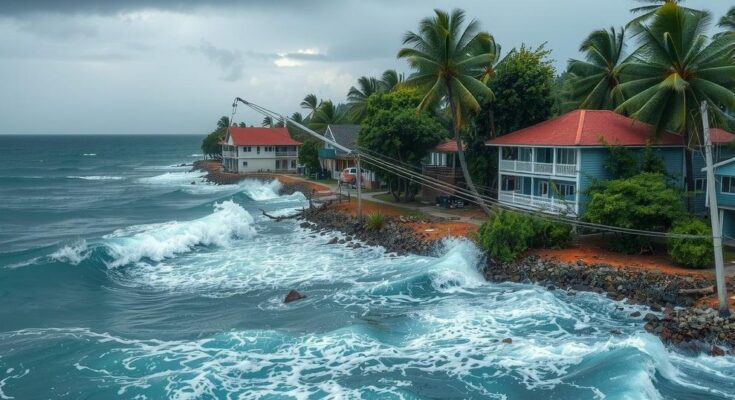Cyclone Chido has wreaked havoc on Mayotte, leaving thousands feared dead and significant destruction in its wake. Rescue operations are complicated by damaged infrastructure and power outages. Experts suggest that climate change may have intensified the cyclone, marking a critical moment for addressing weather-related disasters in vulnerable areas.
Rescue operations are underway in the French overseas territory of Mayotte following the catastrophic impact of Cyclone Chido, which struck the region with unprecedented force, marking it the most severe storm in nearly a century. The official death toll currently stands at 14; however, local officials estimate that the fatalities could reach hundreds, potentially thousands, in this densely populated archipelago of approximately 300,000 inhabitants. Many neighborhoods, characterized by inadequately constructed homes, suffered significant destruction, and essential infrastructure, including airports and hospitals, was severely compromised.
The French government has dispatched rescue workers, military personnel, and medical supplies from the mainland and the nearby territory of Reunion to assist the beleaguered population. With extensive power outages reported and the airport’s control tower damaged, only military aircraft have been able to land, further complicating rescue efforts. The plight of an estimated 100,000 residents living in makeshift slum conditions is particularly critical, as most of their homes have been completely obliterated by the cyclone’s fury.
Cyclone Chido, classified as a category-4 hurricane equivalent, made landfall late Sunday after affecting Madagascar to the south. Experts suggest that climate change has likely exacerbated the intensity of such storms; while the frequency of cyclones has not significantly risen, there has been a notable increase in the ferocity of those that do occur due to elevated ocean temperatures, which create ideal conditions for powerful storms.
Cyclones are intense tropical storms that pose serious threats to regions in their path, particularly in areas like Mayotte, which is notoriously vulnerable due to its socioeconomic factors. The onset of the cyclone season in the southwestern Indian Ocean typically begins in December, with varying impacts based on meteorological conditions. Cyclone Chido represents a critical case study in how changing climate patterns are influencing storm behavior, leading to stronger and more destructive weather events, despite the overall frequency of cyclones remaining static. Furthermore, Mayotte’s socio-economic landscape complicates recovery efforts, as it is one of the poorest regions under the European Union’s jurisdiction, attracting migrants from even less prosperous neighboring nations.
In conclusion, Cyclone Chido has inflicted devastating damage on Mayotte, with fears of significant loss of life and extensive infrastructure damage. The region faces enormous challenges as rescue efforts unfold amidst power outages and damaged transportation facilities. Additionally, this disaster highlights broader issues related to climate change and its effects on storm intensity, urging a reevaluation of emergency preparedness and response strategies in vulnerable regions.
Original Source: www.cbsnews.com




